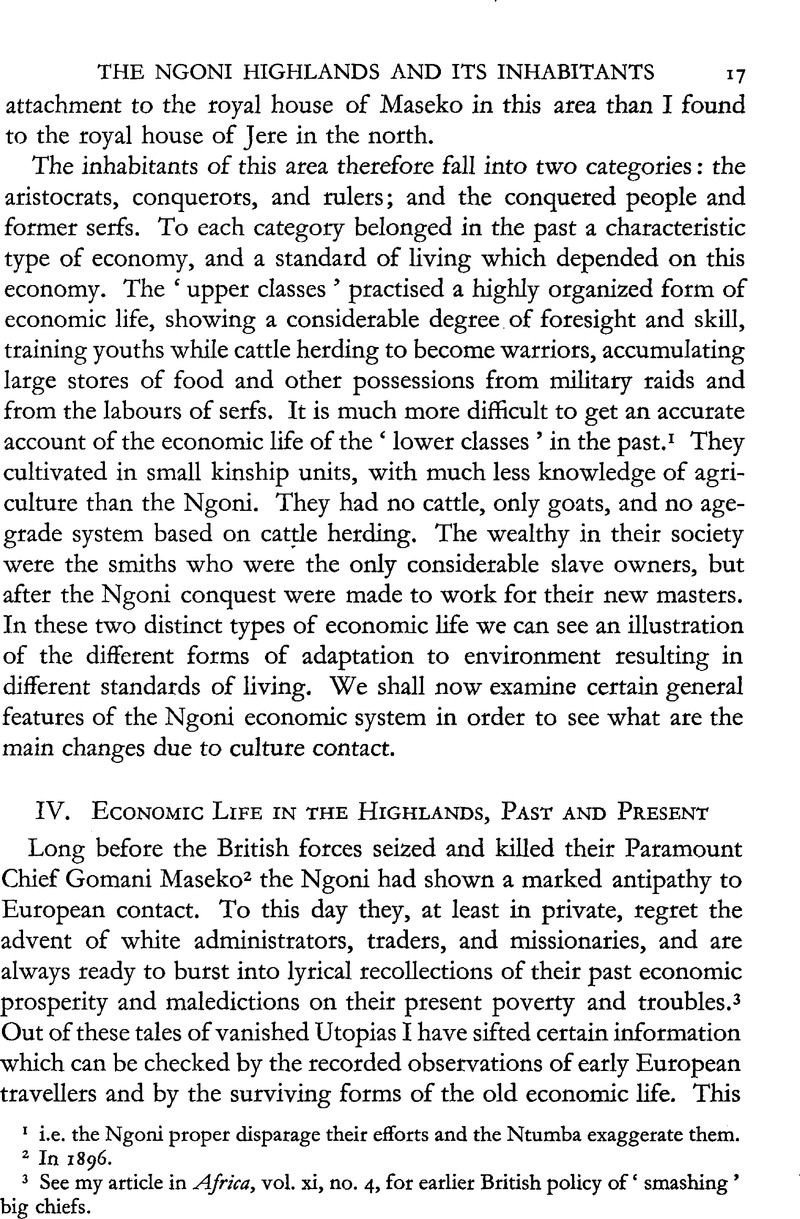No CrossRef data available.
Published online by Cambridge University Press: 21 August 2012

page 17 note 1 i.e. the Ngoni proper disparage their efforts and the Ntumba exaggerate them.
page 17 note 2 In 1896.
page 17 note 3 See my article in Africa, vol. xi, no. 4, for earlier British policy of ‘smashing’ big chiefs.
page 18 note 1 I include in this term all goods made in the villages and used by the people, houses, tools, utensils, weapons, ornaments, &c.
page 18 note 2 See my article in Africa, vol. xi, no. 1.
page 19 note 1 There were no actual sumptuary laws among the Ngoni. Rank was based on clan descent. The original heads of leading clans came with possessions in the form of cattle, slaves, weapons, from the south, and their descendants inherited both their rank and their wealth. Hence to be of the Maseko, Mlangeni, Nqumayo, Ngozo, Nqwana, and other leading clans conferred the unquestioned right to own cattle and slaves.
page 19 note 2 Actually the right to command labour was vested in the social relationship of master to servant, mother-in-law to daughter-in-law, big wife to inferior wife, and so on. But such a right to employ labour was never exercised without bestowing rewards.
page 20 note 1 ulemu, respect, has a great width of meaning, and is fundamental in Ngoni relationships.
page 20 note 2 Food-baskets were used for cereals; wooden platters for meat and cooked blood.
page 20 note 3 This blood was cooked with some of the fat round the kidneys and called ulubende. It was and is a much-prized dish.
page 21 note 1 I have expressly stated Ngoni villages here because I have said (see p. 17) that among the conquered people who lived in their own villages there was a lower standard of living based on their different form of economy, primarily on the absence of cattle.
page 22 note 1 It is difficult for the European in these circumstances to dissociate asking for things as a right (kupempha) from cadging. There is a proverb which I discovered was an almost infallible acid test, especially when said in public. ‘Patsa patsa nkulanda. Mwana wamfulu patsa yeka’, ‘Give give is to snatch. The child of a free man only gives.’ Either the speaker retired covered with shame or he said, ‘No, but I am really in need of soap, or a stamp’, or ‘I am really hungry’. The onlookers who in the first instance jeered at his discomfiture in the second always confirmed his need and said, ‘Yes, you should give to him. What he says is true.’
page 22 note 2 See footnote 2 on p. 19.
page 23 note 1 See Tribal Rule in Transition, p. 18.
page 23 note 2 e.g. there are no longer young warriors to be used for cultivation, nor numbers of subordinate wives.
page 23 note 3 Courtyard outside the chief's house.
page 23 note 4 The relish is an addition to the porridge. It may be meat, fish, beans, other vegetables, or cooked leaves.
page 23 note 5 I have some evidence that this is one of the reasons why men feel forced to emigrate.
page 24 note 1 See p. 13.
page 24 note 2 Wages for carriers were paid in lengths of calico. See Paramount Chief's statement re ‘work for cloth’.